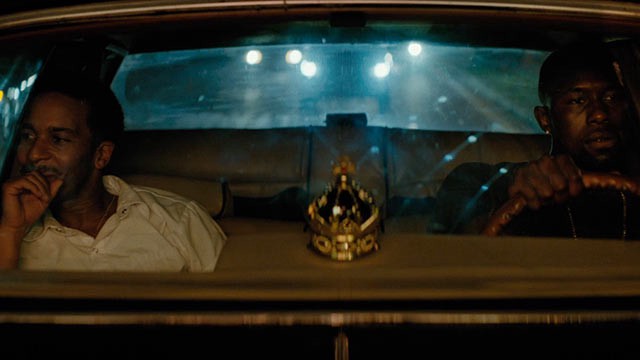 2016 A24
2016 A24
The most memorable line of dialogue in 2016 cinema is, in my opinion, the closing sentence of Moonlight. Black tells Kevin, ?You?re the only man that?s ever touched me.? The line comes somewhat abruptly ? after a few moments of silence ? during the climatic conversation between Black and Kevin in the latter?s house. It is the culmination of Black?s long experience of romantic and sexual deprivation; his yearning underlies all the conversations that transpire between him and Kevin in the preceding sequences. That yearning manifests itself graphically in Black?s physical reaction to Kevin?s voice. During Kevin?s cold call, he apologizes for his grievous mistreatment of Black in the past.
Although Kevin tries to resolve the two men?s history in this way, their past recedes below the surface for much of the conversation that follows Black?s arrival in Miami; the past feels like it may rise above the surface at any time, hence the considerable tension in their dialogue. While they spend a fair amount of time outlining the trajectories of their adult lives, there are two instances in which the past does indeed rise to the surface. The first is that formidable, trancelike moment in which Kevin plays the song on the jukebox that reminded him of Black in the first place. Following this interlude, Kevin poses a question to Black during the car ride to Kevin?s house: ?Come on, man. You just drove down here?? The subtext is clear. Black, however, is unwilling at this juncture to confront the reality of his solitude and the resolution he seeks in a reunion with Kevin. Refusing to meet Kevin?s intense stare, Black averts the inquiry with an emotionless ?Yeah??
 2016 A24
2016 A24
Notwithstanding Black?s reluctance to recognize his pent-up desires, his and Kevin?s facial expressions in that moment reveal that they both know the score. In the last few minutes of their conversation, which occurs inside Kevin?s house, the ?catching up? talk continues for as long as the two men can sustain it. The chat culminates in Kevin?s admission that his life did not transpire the way he had hoped and that he was never worth much. This admission leads to silence, followed by Black?s decision to make his own confession. He finally reveals his fidelity to Kevin over the years and the profound sacrifice and alienation entailed by that fidelity. In spite of the tough drug dealer persona he has adopted ? comprising a rock-hard physique, gold teeth, and a muscle car ? Black is essentially the same scrawny, impoverished, insecure, and unloved child that we saw at the outset of the film ? a boy desperately reaching for love of some kind, be it paternal, fraternal, or romantic.
In short, the last line of Moonlight embodies the psychic and sexual longing that defines Black?s life. The burdens of his homosexuality, his mother?s callousness, the death of Juan (his surrogate father), and the violent severance from Kevin (his sole love interest) all coalesce in a painful, hollow adulthood. Black?s final line lays bare the true nature of that existence, confronting the audience with the stark alienation and deprivation of his mind, body, and soul. Overall, the ending of this film is one of the most unsettling moments in contemporary cinema. Black?s words resonate all the way through the final shot, which shows an estranged young boy illuminated by moonlight, glowing a saturated, somber shade of blue.


